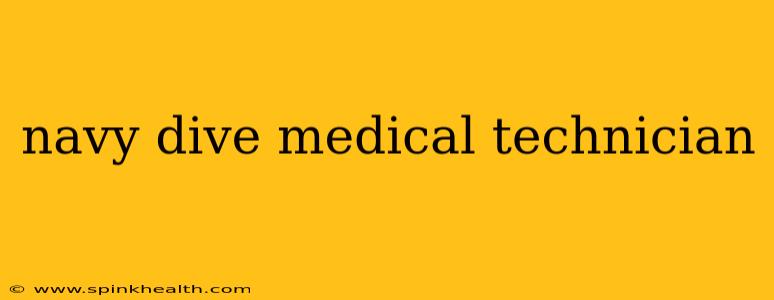The ocean's depths hold mysteries, dangers, and a unique breed of professionals dedicated to exploring them: Navy divers. But behind every daring underwater mission lies a crucial support system, one that ensures the health and safety of these intrepid explorers. This is the realm of the Navy Dive Medical Technician (NDMT), a vital cog in the complex machinery of naval diving operations. Their work is far from glamorous, but it's undeniably critical, demanding a unique blend of medical expertise, technical proficiency, and unwavering dedication.
My journey to understanding the role of an NDMT began with a chance encounter at a naval base. I met Petty Officer First Class (PO1) Ramirez, a seasoned NDMT with years of experience under his belt. His stories weren't filled with dramatic rescues (though he had a few to tell), but rather with the meticulous preparation, the constant vigilance, and the quiet professionalism that defines this critical role.
What Does a Navy Dive Medical Technician Do?
PO1 Ramirez described his day-to-day responsibilities not as a singular task, but as a multifaceted tapestry woven with threads of preventative medicine, emergency response, and technical expertise.
Preventative Care is Paramount: A large part of an NDMT's work revolves around pre-dive medical evaluations. This includes thorough physical examinations, assessing the diver's fitness for the upcoming mission, and ensuring they're free from any conditions that might be aggravated by the pressure changes and physical demands of diving. They are the gatekeepers, ensuring only fit divers enter the water.
Emergency Preparedness: The unpredictable nature of diving operations demands constant readiness. NDMTs are trained to handle a wide range of diving-related medical emergencies, from decompression sickness ("the bends") and air embolism to nitrogen narcosis and other pressure-related conditions. They’re responsible for operating and maintaining the recompression chamber, a crucial piece of equipment used to treat decompression sickness.
Technical Proficiency is Key: Beyond their medical skills, NDMTs possess a deep understanding of diving equipment and procedures. They are responsible for inspecting and maintaining the diving gear, ensuring it's in optimal working order and that divers are using it correctly. Their knowledge extends to the physiological effects of pressure on the human body, allowing them to better assess and treat diving-related injuries.
What are the Qualifications to Become a Navy Dive Medical Technician?
Becoming an NDMT isn't a simple path. It requires dedication, resilience, and a strong foundation in medicine.
What education and training are required?
The journey begins with a strong academic background, often including a degree in a medical-related field. Upon joining the Navy, rigorous training follows. This involves extensive medical instruction, focusing on diving-specific pathologies, as well as hands-on training in operating recompression chambers and managing diving emergencies. This training is demanding, testing both physical and mental fortitude.
What are the physical requirements for this role?
Physical fitness is a must. The work is demanding, requiring stamina, strength, and the ability to work long hours under pressure. Specific physical standards must be met to even qualify for the program.
What is the Career Progression for a Navy Dive Medical Technician?
The Navy offers avenues for advancement. NDMTs can climb the ranks, gaining increased responsibilities and leadership roles within the diving community. Some may even pursue specialized training and certifications, expanding their expertise and impact.
What is the difference between a Navy Dive Medical Technician and a Navy Corpsman?
While both roles serve within the Navy's medical field, their areas of expertise differ significantly. A Navy Corpsman provides a broader range of medical support across various naval settings. In contrast, the NDMT specializes exclusively in diving medicine, possessing a deeper understanding of the unique physiological challenges and risks associated with underwater operations. They are highly specialized medical professionals within the broader field of naval medicine.
What are the long-term career prospects after leaving the Navy?
The skills and experience gained as an NDMT translate well to civilian life. Many transition into roles in hyperbaric medicine, emergency medicine, or other healthcare fields where their unique expertise is highly valued.
PO1 Ramirez's story was a testament to the critical, yet often unseen, contribution of the Navy Dive Medical Technician. Their role is a potent blend of medical expertise, technical skill, and unwavering dedication, ensuring the safety and well-being of Navy divers as they explore the ocean's depths. It's a career path demanding commitment, but one filled with purpose and profound impact.

